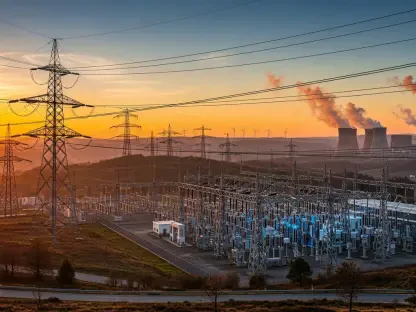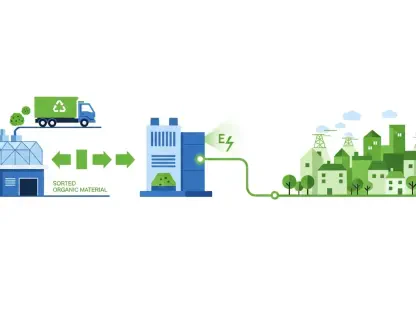Introduction to Nigeria’s Energy Landscape and CNG Initiative
Nigeria stands at a critical juncture in its energy journey, grappling with an over-reliance on traditional fuels like gasoline and diesel, which power much of the nation’s transportation and industrial sectors, while facing a growing demand from a population exceeding 200 million. The environmental toll of carbon emissions and the economic burden of fuel imports have become pressing concerns, painting a vivid picture of a country in dire need of sustainable alternatives to secure its energy future and reduce its ecological footprint.
President Bola Ahmed Tinubu’s administration has introduced a bold initiative to promote Compressed Natural Gas (CNG) as a viable solution to these challenges. This strategic push aims to position CNG as a cleaner, more affordable fuel option, reducing dependence on volatile fossil fuel markets while addressing local energy needs. The plan is not merely a policy shift but a transformative step toward aligning Nigeria with global sustainability trends.
The significance of this transition cannot be overstated, as it promises both environmental benefits through lower emissions and enhanced energy security by leveraging Nigeria’s abundant natural gas reserves. As part of the broader global movement to curb greenhouse gases, CNG offers a practical bridge between conventional fuels and fully renewable options. Key stakeholders, including government bodies, private energy firms, and international partners, are pivotal in driving this initiative forward, setting the stage for a comprehensive overhaul of the nation’s energy framework.
Understanding the Potential of CNG in Nigeria
Key Benefits and Emerging Trends
Compressed Natural Gas presents a compelling array of advantages over traditional fuels, primarily its cleaner combustion, which results in significantly reduced emissions of harmful pollutants like carbon monoxide and particulate matter. Compared to gasoline and diesel, CNG is also more cost-effective over the long term, offering savings for consumers and businesses alike. Its efficiency in powering vehicles and industrial processes further underscores its appeal as a sustainable energy source.
Globally, the shift toward renewable and low-emission energy sources is gaining momentum, and CNG aligns seamlessly with these climate goals while addressing Nigeria’s unique energy demands. Emerging trends show a growing acceptance of alternative fuels in developing economies, where affordability and accessibility are critical. Innovations in CNG technology, such as improved storage systems and conversion kits, are making it easier for markets like Nigeria to adopt this fuel, with potential for widespread consumer uptake if supported by robust infrastructure.
Beyond immediate benefits, the opportunity for market expansion in Nigeria is substantial, driven by the country’s vast natural gas reserves and increasing urbanization. As more industries and transport operators recognize the economic and environmental gains, CNG could become a cornerstone of the energy mix. This trend mirrors global patterns where alternative fuels are reshaping energy consumption, providing a blueprint for localized adaptation and growth.
Current Adoption and Growth Prospects
At present, the adoption of CNG in Nigeria remains in its early stages, with limited infrastructure and low public awareness hindering its reach. Only a small fraction of vehicles and industries have transitioned to this fuel, largely due to the scarcity of refueling stations and the upfront costs associated with conversion. Despite these hurdles, pockets of progress in urban centers hint at a latent demand waiting to be unlocked.
Energy experts, such as Engr. Solomon Oseagah, Managing Director of Excella U Energy Limited, have voiced optimism about CNG’s transformative potential. Speaking at a recent summit on energy efficiency, Oseagah emphasized that widespread adoption of CNG could revolutionize Nigeria’s energy sector, provided there is a coordinated effort from policymakers and private players. His insights reflect a broader consensus among industry leaders that strategic interventions could catalyze change.
Looking ahead, growth projections for CNG usage in Nigeria are promising, particularly if supported by policy incentives like tax breaks and subsidies for conversion. Market drivers, including rising fuel costs and environmental regulations, are expected to fuel demand over the next few years. If current efforts persist, industry forecasts suggest a significant uptick in adoption by 2027, marking a pivotal shift in how energy is consumed across the nation.
Challenges in Implementing the CNG Initiative
The path to mainstreaming CNG in Nigeria is fraught with obstacles, chief among them being the lack of adequate infrastructure to support its distribution and use. The scarcity of refueling stations across the country poses a significant barrier, particularly in rural areas where access to alternative fuels remains a distant prospect. Additionally, technological limitations in retrofitting existing vehicles for CNG compatibility add to the complexity of scaling up adoption.
Market-driven challenges further complicate the landscape, with the high initial costs of conversion deterring many potential users. For small-scale transporters and individual vehicle owners, the financial burden of switching to CNG can be prohibitive without external support. Coupled with public skepticism about the reliability and safety of this fuel, these economic factors create a hesitancy that slows progress.
Addressing these issues requires a multifaceted approach, including government subsidies to offset conversion costs and investments in building a network of refueling stations. Private sector involvement can accelerate infrastructure development, while public education campaigns are essential to dispel myths and build trust in CNG as a dependable alternative. Collaborative efforts between stakeholders hold the key to overcoming these barriers and fostering acceptance.
Policy and Collaborative Frameworks Supporting CNG
Under President Tinubu’s administration, the regulatory environment for CNG and renewable energy in Nigeria is evolving to encourage adoption. Policies aimed at incentivizing the use of alternative fuels, such as reduced tariffs on CNG equipment and mandates for public transport fleets to transition, are gaining traction. These measures signal a commitment to creating a conducive ecosystem for clean energy solutions.
International partnerships play a vital role in bolstering these efforts, with organizations like the Thailand International Cooperation Agency (TICA) and the Royal Embassy of Thailand providing critical support. Through training programs, scholarships, and knowledge-sharing platforms, these collaborations enhance local capacity in energy innovation. Events like summits on energy efficiency have facilitated dialogue among policymakers and experts, fostering actionable strategies for implementation.
Compliance with environmental standards remains a priority, as aligning local policies with global sustainability goals ensures Nigeria’s integration into the broader clean energy movement. The impact of such global-local synergy is evident in professional development initiatives that equip Nigerian energy leaders with cutting-edge skills. These frameworks underscore the importance of sustained cooperation to achieve long-term energy objectives.
Future Outlook for CNG and Clean Energy in Nigeria
The long-term vision for CNG under Tinubu’s leadership envisions it as a cornerstone of Nigeria’s energy transition, complementing other renewable sources like solar and wind. This roadmap prioritizes scaling infrastructure and reducing costs to make CNG accessible to a broader population. Ambitious targets for adoption reflect a determination to reshape the energy sector over the coming decades.
Emerging technologies, such as advanced CNG storage solutions and hybrid systems, could further enhance its viability, while potential disruptors like electric vehicles may influence market dynamics. Shifting consumer preferences toward eco-friendly options are likely to drive demand, provided awareness and affordability improve. These factors collectively point to a dynamic future where adaptability will be crucial for success.
Youth engagement and education are also central to this outlook, as fostering a culture of sustainability among younger generations ensures lasting change. By integrating energy literacy into academic and community programs, Nigeria can build a foundation for informed decision-making. Global economic conditions, regulatory shifts, and continuous innovation will undoubtedly shape this trajectory, requiring agility from all stakeholders involved.
Conclusion: Building a Sustainable Energy Future
Reflecting on the journey so far, Tinubu’s CNG initiative has emerged as a beacon of hope for Nigeria’s clean energy aspirations, despite the hurdles that initially stood in the way. The discourse around its potential reveals a shared determination among experts and policymakers to address energy challenges through innovative means. Each step taken highlights the delicate balance between immediate obstacles and the promise of a greener horizon.
Moving forward, actionable strategies have become paramount, with a focus on expanding refueling infrastructure through public-private partnerships. Policymakers are urged to prioritize sustained funding for subsidies, while industry leaders take on the responsibility of driving technological advancements. Communities play a vital role too, as grassroots campaigns aim to shift perceptions and build trust in alternative fuels.
The next phase demands a unified push toward integrating CNG into Nigeria’s broader energy policy, with an eye on leveraging international expertise to accelerate progress. This collaborative spirit lays the groundwork for Nigeria to not only meet its domestic energy needs but also contribute meaningfully to global sustainability efforts. The path ahead, though challenging, offers a clear opportunity to redefine the nation’s role in the clean energy landscape through persistent dedication.









